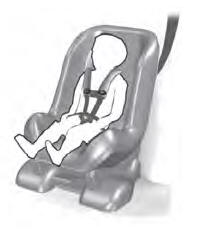Lincoln Aviator 2020-2025 Owners Manual / SYNC™ 3 / Electric Vehicle Information / Power Flow. Vehicle Operational States
Lincoln Aviator: Electric Vehicle Information / Power Flow. Vehicle Operational States
Power Flow
 The Power Flow information for
your plug-in hybrid vehicle is
available through the Home screen
or under Apps.
The Power Flow information for
your plug-in hybrid vehicle is
available through the Home screen
or under Apps.
Vehicle Operational States
Power will flow to or from the front and rear wheels depending on operational state and drive conditions.
- Idling: The vehicle is running and in park (P). The engine and, or the high voltage battery are on.
- Electric Driving: The vehicle is running and in drive (D) or neutral (N). The high voltage battery provides power to the wheels.
- Hybrid Driving: The vehicle is running and in drive (D) or neutral (N). The engine and the high voltage battery provide power to the wheels.
- Engine Driving: The vehicle is running and in drive (D) or neutral (N). The engine provides power to the wheels.
- Regenerative Braking: The vehicle is running in drive gear (D) and is slowing down. The regenerative braking system captures power and sends it back to the high voltage battery.
- Charging: The vehicle is plugged in and the high voltage battery is being charged.
 Engine On Due To
Engine On Due To
The following conditions help to explain why
the engine is on, and what you can do to
allow all electric operation.
Drive Power: The engine is on due to
accelerator pedal pressure or speed
control activation...
Other information:
Lincoln Aviator 2020-2025 Service Manual: Description and Operation - Parking Aid - System Operation and Component Description
System Operation Active Park Assist System Diagram Item Description 1 PCM 2 with 14 or 28 speaker system 3 GWM 4 TRM 5 APIM 6 Audio system display 7 SCCM 8 PSCM 9 ATCM 10 ABS module 11 BCM 12 ACM 13 IPC 14 DSP 15 Rear door speakers 16 Front door speakers 17 IPMB 18 Right front active sensor 19 Left front active sensor 20 Right rear active sensor 21 Left rear active sensor 22 PAM Network Message Chart IPMB Network Input Messages Broadcast Message Originating Module Message Purpose ABS active ABS module Disables the active park assist if an ABS activation occurs...
Lincoln Aviator 2020-2025 Service Manual: Diagnosis and Testing - Charging System
Diagnostic Trouble Code (DTC) Chart Diagnostics in this manual assume a certain skill level and knowledge of Ford-specific diagnostic practices. REFER to: Diagnostic Methods (100-00 General Information, Description and Operation). Diagnostic Trouble Code Chart Module DTC Description Action BCM B11DB:02 Battery Monitoring Module "A": General Signal Failure GO to Pinpoint Test F BCM B11DB:08 Battery Monitoring Module "A": Bus Signal/Message Failures GO to Pinpoint Test F BCM B11DB:09 Battery Monitoring Module "A": Component Failures GO to Pinpoint Test F BCM B11DB:11 Battery Monitoring Module "A": Circuit Short To Ground GO to Pinpoint Test F BCM B11DB:49 Battery Monitoring Module "A": Internal Electronic Failure GO to Pinpoint Test I BCM B11DB:55 Battery Monitoring Module "A": Not Configured GO to Pinpoint Test J BCM B1489:11 Battery Monitoring System (BMS) Sensor Power: Circuit Short To Ground GO to Pinpoint Test F PCM P0562:00 System Voltage Low: No Sub Type Information GO to Pinpoint Test B PCM P0563:00 System Voltage High: No Sub Type Information GO to Pinpoint Test A PCM P065B:00 Generator "A" Control Circuit Range/Performance: No Sub Type Information GO to Pinpoint Test B PCM P065C:00 Generator "A" Mechanical Performance: No Sub Type Information GO to Pinpoint Test B PCM P0A3B:00 Generator "A" Over Temperature: No Sub Type Information GO to Pinpoint Test K PCM P0A5A:00 Generator Current Sensor Circuit Range/Performance: No Sub Type Information GO to Pinpoint Test E PCM P0A5B:00 Generator Current Sensor Circuit Low: No Sub Type Information GO to Pinpoint Test E PCM P0A5C:00 Generator Current Sensor Circuit High: No Sub Type Information GO to Pinpoint Test E PCM U012D:00 Lost Communication With Generator "A" Control Module: No Sub Type Information GO to Pinpoint Test G PCM U042E:00 Invalid Data Received From Generator "A" Control Module: No Sub Type Information GO to Pinpoint Test G Inspection and Verification Verify the customer concern by operating the charging system...
Categories
- Manuals Home
- Lincoln Aviator Owners Manual
- Lincoln Aviator Service Manual
- Refueling
- Keyless Entry
- Drive Modes
- New on site
- Most important about car
Child Seats

Use a child restraint (sometimes called an infant carrier, convertible seat, or toddler seat) for infants, toddlers and children weighing 40 lb (18 kg) or less (generally four-years-old or younger).
Using Lap and Shoulder Belts
WARNING: Do not place a rearward facing child restraint in front of an active airbag. Failure to follow this instruction could result in personal injury or death.
Copyright © 2025 www.liaviator2.com

